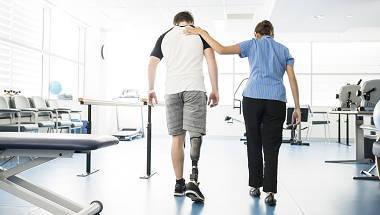Rehabilitation after traumatic injury should support people in resuming their lives
27 Jul 2021 01:11 PM
NICE yesterday (27 July 2021) published a new draft guideline covering rehabilitation after traumatic injury.

Rehabilitation following traumatic injury should focus on the person’s goals and help them to resume their life, whether that involves work, education or activities, according to the draft recommendations. Rehabilitation is a process that starts in acute care in hospital when an injured person is admitted and can progress into work, education and community settings.
Traumatic injury is any injury that requires admission to hospital at the time of injury. This could include musculoskeletal injuries, nerve injuries, soft tissue damage, and limb loss. Traumatic injury is a significant cause of early death and morbidity and is the biggest cause of death in children and adults under the age of 40. In England, 45,000 people are affected by very severe or major trauma every year.
Trauma can negatively affect quality of life, both physically and mentally, and can lead to problems with mobility, pain, breathing, and speech and communication. Trauma can also lead to depression, anxiety and other psychological difficulties.
The draft recommendations advise that the rehabilitation needs of the injured person should be assessed and discussed with the person and their family at an early stage. The injured person should be encouraged to think about rehabilitation goals which can be used to inform medical or surgical treatment options. Short- and long-term goals should be agreed between the injured person, their family members or carers and healthcare professionals depending on what is important to the injured person and their aspirations in life. These goals should be reviewed regularly and should be flexible as setbacks to rehabilitation may occur.
The draft guideline recommends that healthcare professionals assess the impact of a traumatic injury using a person-centred and individualised approach throughout rehabilitation, as the severity of an injury does not necessarily reflect the complexity of their needs.
Dr Paul Chrisp, director of NICE’s centre for guidelines, yesterday said:
“Improved survival rates following major trauma has led to an increased need for rehabilitation services. Traumatic injury can cause huge disruption to people’s lives, but effective rehabilitation can really help them to get back to the best possible level of function and independence. Whatever the injured person’s goals, if that means being able to go back to work or play their favourite sport again, or to be able to share a meal with their family, it’s important that the right support is in place to allow them to achieve these aims.
“Coordination and communication between the various services supporting the injured person’s rehabilitation is key, and we hope these draft recommendations not only help practitioners to deliver high quality care, but also supports consistent care across the country.”
The draft guideline outlines how to develop a rehabilitation plan and how to monitor progress against the plan. The draft recommendations advise assigning a named rehabilitation coordinator or key worker to oversee the injured person’s care while they are in hospital.
When the injured person is discharged from hospital their needs should be reassessed and the rehabilitation plan reviewed. They should be provided with a single point of contact at the hospital for information, help and advice for a limited time period, for example three months. If the injured person consents, family members and carers should be actively involved in the transition to outpatient and community services.
The draft guideline also includes recommendations to support physical, cognitive and psychological rehabilitation, and for specific injuries such as spinal cord injuries and limb loss or reconstruction.
The consultation is open until 8 September 2021. You can read the draft guideline and comment on the consultation here.